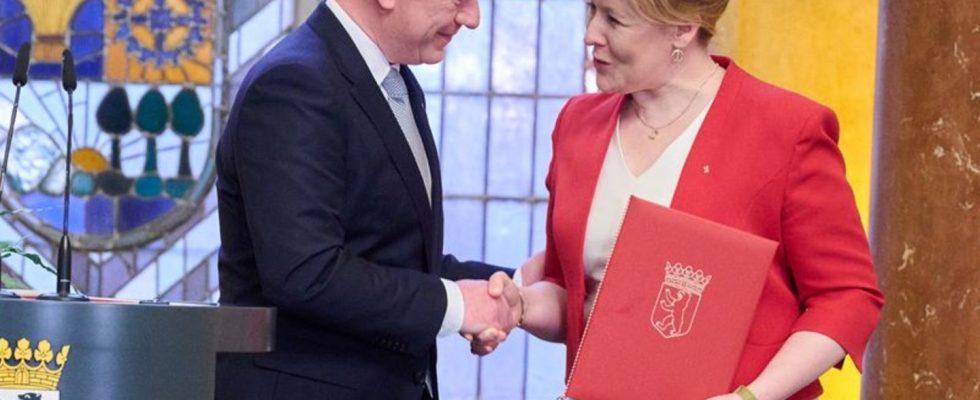Berlin House of Representatives
Wegner new Prime Minister in Berlin after a nail-biter
Berlin’s new Governing Mayor Kai Wegner (CDU) appoints his predecessor Franziska Giffey (SPD) as Senator for Economics, Energy and Public Enterprises. photo
© Annette Riedl/dpa
Instead of red-red-green, it’s now black-red in Berlin: The CDU politician Kai Wegner is the new governing mayor of the federal capital. But his start is not exactly smooth.
After a long nail-biter, the CDU politician Kai Wegner is the new governing mayor of Berlin. The 50-year-old failed twice in yesterday’s elections in the House of Representatives, even though his CDU and its coalition partner SPD have enough mandates. In the third ballot it was enough for Wegner.
He received 86 votes – that’s how many mandates the CDU and SPD have in the state parliament. In the voting round, the AfD declared its support for Wegner. Whether – and if so how many – AfD MPs ultimately voted for the CDU man cannot be said with certainty given the secret ballot. But there was heavy criticism of the governing parties from the Greens and Left. Wegner himself said in the evening that he would not be deterred.
Wegner with a clear statement on the AfD
“I believe that the AfD wants to create chaos here,” said the new head of government in an RBB special. “She wants to use that. Because I can’t imagine with the best will in the world that the AfD would elect a governing mayor who would bring the biggest AfD hunter from all of Germany to Berlin. So it’s a tactic, a strategy.” With “AfD-Jägerin” Wegner is likely to refer to the new Senator for Justice Felor Badenberg, who previously worked in the Federal Office for the Protection of the Constitution and was also responsible for classifying the AfD as a suspected right-wing extremist.
The new coalition of CDU and SPD has 86 votes and the opposition of the Greens, Left and AfD has 73. The majority was 80 votes. In the first ballot, Wegner initially received 71 votes, in the second attempt 79. It was only in the third ballot that 86 votes came together for Wegner. Immediately after his election, he took over the official business in the Red Town Hall from the SPD politician Franziska Giffey. The ten senators of the new black-red Senate were sworn in.
Resistance to black and red in their own ranks
After a defeat in the repetition of the parliamentary elections in February, Giffey ended the coalition with the Greens and the Left, renounced the office of governing mayor and forged an alliance with the CDU. But there is resistance to black and red in the SPD.
After Wegner failed twice, politicians from the CDU and SPD blamed each other for the election debacle. Wegner spoke in the evening in the RBB of obvious deviants in the CDU and SPD. It is now about convincing through good work.
Berlin’s SPD state and parliamentary group leader, Raed Saleh, told the German Press Agency: “In the end, it worked with our own majority of 86 votes.” The fact that three ballots were necessary was not nice. “But it’s not the first time it doesn’t work in the first or second ballot,” Saleh said. “That’s exactly why the constitution provides for three rounds of voting. But of course I would have preferred something else.
Greens Federal Chairwoman Ricarda Lang wrote on Twitter: “The SPD and the CDU in Berlin have done great damage to the city, democracy and the political culture today by going into the third ballot without a secure majority – and thus allowing that the AfD can claim Wegner’s election for itself.” Jan Korte, leader of the Left parliamentary group in the Bundestag, wrote: “Wegner has no scruples about being sworn in, despite the suspicion of being the governing mayor by the grace of the AfD fascists.”
When asked how many votes there were from her parliamentary group, AfD parliamentary group leader Kristin Brinker told the dpa: “Assume half of it.” When asked by dpa about the secret election, five of the 17 AfD parliamentarians initially stated that they had voted for Wegner.
The dramatic vote brought back memories of the election of the former Governing Mayor Klaus Wowereit (SPD) in 2006. The SPD politician was only re-elected in the second ballot with the narrowest majority of one vote. Parallels were also drawn with the election of the FDP politician Thomas Kemmerich in Thuringia, who briefly became Prime Minister of Thuringia in 2020 with votes from the CDU and AfD.
Berlin last in 2001 with CDU mayor
Wegner is the first governing mayor from the ranks of the CDU after Eberhard Diepgen, who held this office until June 2001. Since then, the SPD has always had the say in the Red City Hall, since 2016 in a coalition with the Greens and the Left. The Berlin CDU parliamentary group in the House of Representatives elected Dirk Stettner as their new chairman in the evening.
In his own words, Wegner sees the coalition with the SPD as a marriage of convenience. The coalition agreement includes a climate protection program worth billions, administrative reform, better equipment for the police and fire brigade and significant progress in housing construction. Wegner wants to make digitization and administrative modernization a top priority. Predecessor Giffey takes over the post of Economics Senator in the new Senate.

